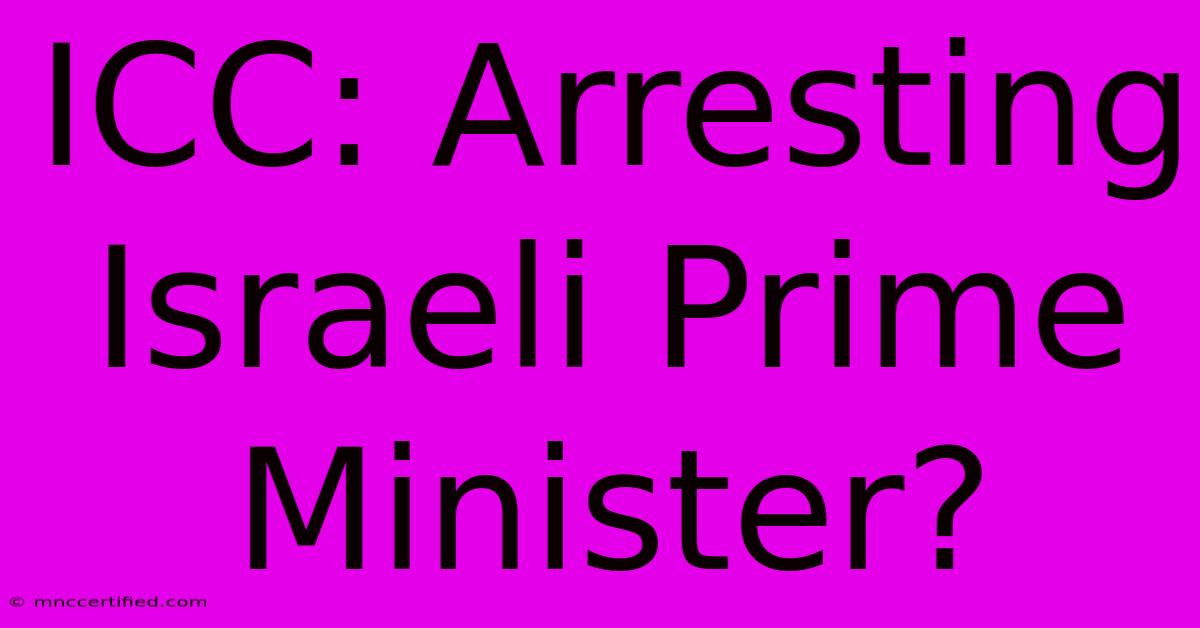ICC: Arresting Israeli Prime Minister?

Table of Contents
ICC: Arresting Israeli Prime Minister? Navigating International Law and Geopolitics
The International Criminal Court's (ICC) potential investigation into alleged war crimes committed in the Palestinian Territories has ignited a firestorm of international debate. A key element fueling this controversy is the possibility of an arrest warrant being issued for Israeli Prime Minister Benjamin Netanyahu, or other high-ranking Israeli officials. This article delves into the complex legal and geopolitical implications of such a move.
Understanding the ICC's Mandate
The ICC is an independent, permanent court established to prosecute individuals for the most serious international crimes, including genocide, war crimes, crimes against humanity, and the crime of aggression. Its jurisdiction is based on the Rome Statute, an international treaty ratified by many nations but notably not by Israel, the United States, and several other key players. This lack of ratification is a crucial factor in the current situation.
The Palestine Situation: A Complex Legal Landscape
Palestine became a state party to the Rome Statute in 2015, granting the ICC jurisdiction over alleged crimes committed within the Palestinian territories since June 13, 2014. This decision has been fiercely contested by Israel, which argues that the ICC lacks jurisdiction over its actions, citing its lack of ratification and questioning the legitimacy of Palestine's statehood. The core legal battle revolves around the definition of "occupation" and the applicability of international humanitarian law.
The Potential for Arrest: Legal Ramifications and Practical Challenges
Should the ICC proceed with an investigation and issue an arrest warrant for Prime Minister Netanyahu or other Israeli officials, several significant legal and practical challenges would emerge:
Legal Challenges:
- Jurisdictional Disputes: Israel's refusal to recognize the ICC's jurisdiction forms the bedrock of its opposition. It argues the court is biased and politically motivated.
- Principle of Complementarity: The ICC’s mandate is based on the principle of complementarity, meaning it only steps in if a state is unwilling or unable genuinely to investigate and prosecute crimes. Israel maintains it has its own robust judicial system.
- Sovereignty and State Immunity: Issuing an arrest warrant for a sitting head of government raises profound questions about national sovereignty and the potential violation of diplomatic immunity.
Practical Challenges:
- Enforcement: The ICC relies on states to cooperate in the arrest and extradition of individuals. Given Israel's non-cooperation, enforcement would be extremely difficult, potentially leading to a protracted legal battle with little practical outcome.
- International Relations: An arrest warrant could severely damage relations between Israel and the international community, potentially escalating tensions in an already volatile region.
- Political Ramifications: The arrest could trigger widespread protests and instability within Israel and spark conflict with other nations.
Geopolitical Implications: A Volatile Equation
The potential arrest of an Israeli Prime Minister carries immense geopolitical significance. It's not just a legal matter; it’s a crucial element in the broader Israeli-Palestinian conflict, influencing alliances and potentially triggering unforeseen consequences. The situation underscores the limitations of international law in the face of deeply entrenched geopolitical realities.
Impact on Regional Stability:
The move could destabilize the region, potentially igniting further conflict between Israel and Palestine, escalating regional tensions, and impacting the ongoing peace process.
Impact on International Relations:
The decision will test the strength and effectiveness of international law and potentially fracture alliances based on support for or opposition to the ICC’s actions.
Conclusion: A Complex and Unpredictable Future
The possibility of the ICC arresting an Israeli Prime Minister remains a highly contentious and unpredictable situation. The legal complexities, the geopolitical ramifications, and the significant practical challenges involved make a decisive outcome difficult to foresee. The situation highlights the persistent tension between the pursuit of international justice and the realities of power dynamics in international relations. Further developments will significantly impact the future of international law and the Israeli-Palestinian conflict.

Thank you for visiting our website wich cover about ICC: Arresting Israeli Prime Minister?. We hope the information provided has been useful to you. Feel free to contact us if you have any questions or need further assistance. See you next time and dont miss to bookmark.
Featured Posts
-
Is Myobrace Covered By Insurance
Nov 22, 2024
-
Live Updates Steelers Vs Browns Game
Nov 22, 2024
-
How Much Does Bar Insurance Cost
Nov 22, 2024
-
Will Insurance Cover Trt Therapy
Nov 22, 2024
-
Storm Bert Snow Rain And Wind
Nov 22, 2024